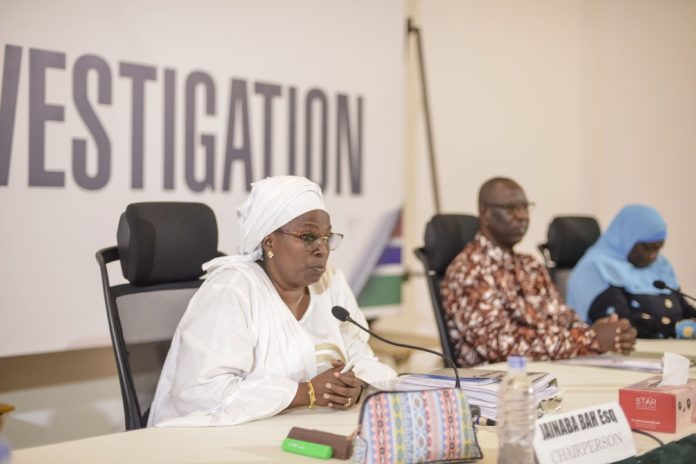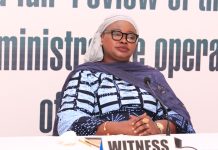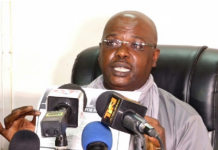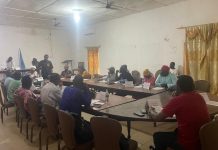By Makutu Manneh
Mr Lamin Suso, who is adversely mentioned in the ongoing Inquiry, has admitted before the Local Government Commission of Inquiry that he lacks the requisite qualifications to hold the position of Finance Director at the Basse Area Council (BsAC).
The professional qualifications required for the position of finance director at the council include ACCA Level 3 or bachelor’s degree in Accountancy while the experience required was at least one (1) year serving as the finance manager in a reputable institution.
Suso said he did not fulfill the professional requirements but got the needed experience as he was the finance manager of the Brikama Area Council for 3 years.
“Yes, I don’t have the qualification but I was appointed by the Local Government Service Commission,” he said.
The former Basse Area Council Finance Director said he worked at the Brikama Area Council from 2005 to 2021 as he started as a revenue collector, later becoming a senior revenue collector then a cashier, accounts clerk 1, accounts clerk 2, senior accounts clerk, and then the finance manager.
He said he enrolled at the American International University but he could not proceed with the course because of his work.
On how he was appointed as the Director of Finance of the Basse Area Council, Lamin Suso applied for the job after the council made an advertisement through The Point Newspaper on 7 October 2020 advertising the vacancy of the position of the Director of Finance of the Basse Area Council. The Newspaper was tendered and admitted as an exhibit.
However, the Commission observed that the advertisement was for both Basse and Janjanbureh Area Councils. Lamin Suso said he only applied for the Basse Area Council based on personal reasons.
Suso testified that he sent the application to the Local Government Service Commission, where he was interviewed and he became successful. His letter of appointment was tendered and admitted accordingly. He testified that he reported to work on 1 February 2021.
Testifying on how budgets are prepared, he said the process starts from a circular that is sent by the CEO to the councilors and unit heads to submit their priorities for consideration in the budget. He explained that the Finance and Budget Sub-Committee usually meets around September to discuss the budget.
The witness said he was a member of the Sub-Committee together with the CEO, some Councillors, and the budget officer. He added that the Ward Councillors would be asked to come before the sub-committee and defend their projects and from there, the committee would select the projects to be implemented.
He said the Council appointed the Clerk on their own and usurped the functions of the Local Government Service Commission. Section 44 of the Local Government Act provides that the Clerk of the Council shall be appointed by the Local Government Service Commission.
Mr Suso stated that the Clerk was an intern from the University of The Gambia and was appointed after the internship.
The Commission noted that the development budget of the Basse Area Council for 2022 was D17,018,375.68 and the total budget was D40,998,637.05.
The witness admitted that the Basse Area Council development budget did not meet the statutory budget of 60% in 2022. He added that this was due to the recurrent expenditures of the council and the lack of 25% subvention from the Government.
“Where is it written that the 25% should be part of your budget allocations?” Chairperson Jainaba Bah quizzed.
The witness was allowed to make a search or reference from the law books but he could not make any reference to the law.
Lead Counsel, Yakarr Cox, told the witness that the development budget has to be sixty (60) percent, and the twenty-five (25) percent is to support the council.
“Yes,” Suso responded.
Asked why the council was spending on salaries and operations, and doing little development for the people, he responded that the 60-40 percent is a challenge for the council as it could not meet its priorities, saying “we are doing everything possible to meet up the requirements”.
“You doubled your salary but you did not increase jobs?” Lawyer Cox asked.
At this juncture, lawyer Cox told the witness that the estimated allowance for 2020 was a little over 1 Million Dalasi, but as of the end of December 2020, the expenditure made on allowances was over 3.5 Million Dalasi.
The witness said about seven (7) of them were paid allowances monthly for using the IFMIS System. He said the payments were as follows: D10,000 for the CEO, D8,000 for the Director of Finance, D5,000 for the Acting Finance Manager, D5,000 for the Budget Officer, D5,000 for Planning and Engineer, and payments for these allowances, according to him, were approved by the general council for using IFMIS System.
The witness added that the CEO and he (Suso) convinced the general council to approve the payment of the allowances. He was asked to provide the general council resolution.
“Why do you decide to convince the general council to pay you an allowance for something that comes to make your work easy?” Lawyer Yakar Cox asked, with the witness refusing to answer the question.
Further asked whether he made any submission that the allowance was unnecessary, the witness said he did not say anything against the payment of the allowances.
Mr Suso informed the Commission that at Brikama Area Council, he was using the IFMIS System but was not paid any allowance for using it, adding that the introduction of the IFMIS System at the Basse Area Council found him already working for the council. The Basse Area Council started using the IFMIS System in March 2021 while the witness commenced work at the Council in February 2021.
According to Suso, there was an extraordinary meeting summoned by the Chairman of BsAC to discuss the 30% salary increment and allowance. He recalled that about 10 councilors attended it and that the Basse Area Council has 20 council members.
When asked how the meeting was called, the witness said he didn’t know. However, he said the salary increment was agreed at that meeting and was implemented forthwith.
“You know that you do not have the right to increase their allowances and you knew very well that it was wrong?” Lawyer Yakarr Cox put it to him.
“Yes,” the witness retorted.
“You did not go back to the Ministry to obtain approval?” Lawyer Cox pressed.
“Yes, we did not do that,” he said.
On why the Council was bypassing the Internal Auditor, Lamin Suso said the Internal Auditor claimed that she was not competent, which was the reason why she was sidelined.




















